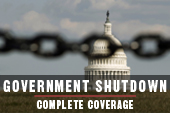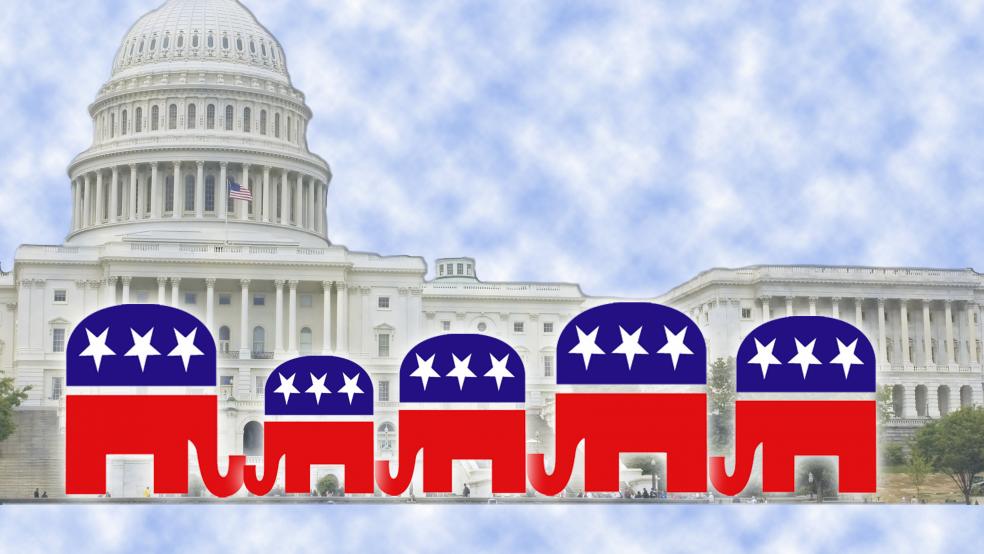Not all conservative House Republicans are pleased with a strategy that all but guaranteed  the government shutdown.
the government shutdown.
With the government closed since last Tuesday, their demands to stop and then delay Obamacare has fallen on deaf ears in the White House. Voters are mostly blaming the GOP for the partial shutdown, a perception the party is desperately trying to reverse by passing piecemeal spending bills that get rejected by the Democratic Senate. A CBS poll says 44 percent of Americans blame the GOP, while 35 percent blame President Obama and the Democrats in Congress.
THE FOUR FACES OF THE GOP
The caucus has essentially split along four lines: the leadership who decides strategy, the diehards willing to accept the shutdown, the skeptical loyalists, and the pragmatists with heavily Democratic districts.
RELATED: GOP MODERATES RALLY TO STOP THE SHUTDOWN
House Speaker John Boehner (R-OH) insists his caucus is united, despite misgivings from donors and outraged calls to change course from GOP congressmen in states friendly to Obama. “I have 233 Republicans in the House,” Boehner told ABC News on Sunday. “And you've never seen a more dedicated group of people who are thoroughly concerned about the future of our country.”
For a deal to take place, the skeptical loyalists and the pragmatists must convince the leadership to change course. They are the proverbial swing voters inside the House.
Rep. Devin Nunes (R-CA) is a skeptical loyalist. A six-term congressman with a low public profile, Nunes supports Boehner and dislikes the health insurance overhaul in the 2010 Affordable Care Act.
Nunes thinks that Republicans are playing a losing hand, accepting a bet encouraged by Sen. Ted Cruz (R-TX) and other Tea Partiers that turned out to be a self-destructive bluff. He dismisses the Cruz acolytes in the House as “lemmings.” He wants his constituents to know that this is “not a winning strategy,” even though he sees no choice for the moment other than sticking with Boehner and the current stalemate.
THE PASSION OF PRIMARY POLITICS
“Now, when you make the jump into the Valley of Death, you got to keep running,” said Nunes, the son and grandson of farmers in California’s Central Valley.
Congressmen like Nunes have to be careful to avoid getting primary challenges from upstart Republicans who might share many of his beliefs but prefer slash-and-burn tactics. Groups such as the Club for Growth are actively trying to get 10 Republican congressmen ‘primaried’ next year, although Nunes is not on their list.
The skeptics are willing to let the shutdown play out, hoping the diehards change course soon enough so that President Obama—who has refused to negotiate on the shutdown or the debt ceiling—decides to finally come to the bargaining table.
“I think the best way out of this is that, once Ted Cruz has decided this is not going to work, then we’ve got to get the president and the Senate to sit down and act like adults and come up with a global agreement where everybody wins, meaning, not politically, but that we set the country on the right course,” Nunes said.
RELATED: THE SHUTDOWN WILL DEFEAT THE GOP IN 2014
But the skeptics have yet to push leadership to changing course. That’s largely been the mission of roughly 18 GOP pragmatists who hail from districts where Obama has a strong foothold.
In Tulare County, a major part of Nunes’ district, Republican presidential nominee Mitt Romney received more than 56 percent of the vote.
Compare that to Rep. Peter King (R-NY), a leader of the pragmatists whose Long Island district was won by Obama with 52 percent of the vote. The president similarly won the counties in the congressional district of Rep. Charlie Dent (R-PA), another pragmatist pressing to end the shutdown.
That same trend applies for congressmen in suburban Philadelphia on both the Pennsylvania and New Jersey sides. Obama also performed well in four Virginia congressional districts represented by Republicans who—according to Roll Call—are willing to vote for a clean continuing resolution.
Just as some Republicans worry about a primary challenger from the right, these lawmakers might have to contend with a Democrat in the general election. Polling shows that voters overwhelmingly oppose the GOP strategy of using a shutdown and the debt ceiling to block Obamacare.
According to a survey released last week by Quinnipiac University, Americans oppose the shutdown in order to stop the Affordable Care Act by a margin of 72 percent to 22 percent. On the debt ceiling, the margin is 64 percent to 27 percent.
King has indicated that he would not sign a discharge petition so that House Democrats could bring some kind of clean CR to the House floor, but he still considers the attempt to defund Obamacare to be a mistake, particularly since the program’s health insurance exchanges opened last Tuesday.
“The fact is, it was done in the House, and the government is now closed, and Obamacare is going forward,” King said on “Fox News Sunday.” “This was a strategy that never could have worked.”
But the president should not automatically consider these pragmatists to be his allies. King wants to negotiate over an increase to the debt ceiling by Oct. 17. The administration has insisted that it won’t negotiate over raising the country’s $16.7 trillion borrowing authority, even as it warns that the fallout would be catastrophic enough to shove the economy back into a recession.
And as long as the pragmatists and skeptical loyalists stay in the same place as they are now, the administration will continue to hammer into the GOP as Treasury Secretary Jack Lew did yesterday in TV interviews.
“We’re on the verge of going into a place we’ve never been,” Lew said on NBC’s “Meet the Press.” “If we run out of cash to pay our bills, there is no option that permits us to pay all of our bills on time -- which means that a failure of Congress to act would for the first time put us in a place where we’re defaulting on our obligations as a government.”


